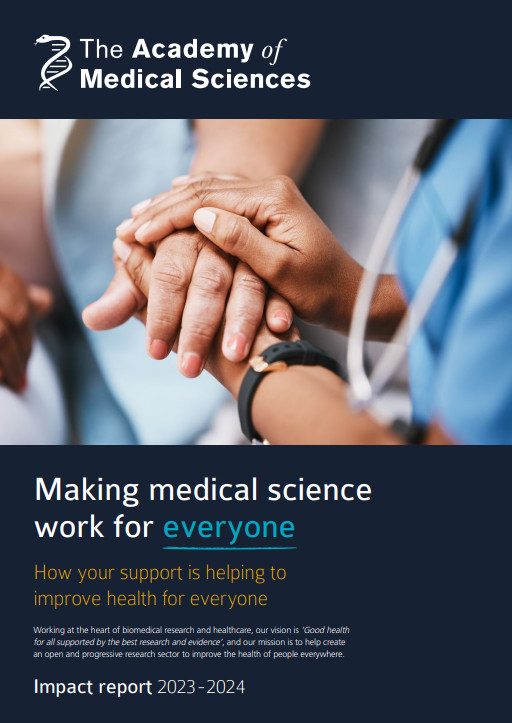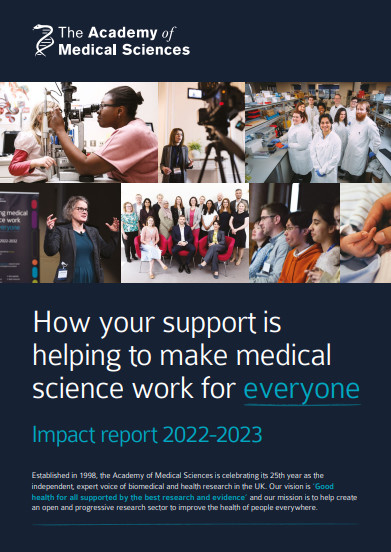With the support of people like you, the Academy of Medical Sciences is championing researchers like Professor Catriona Waitt, whose Starter Grant for Clinical Lecturers enabled her to shape a career of innovative research that is protecting women and babies across the globe.
Support researchers to save lives with a donation today
How can you make an evidence-based decision without any evidence?
This is the question that Catriona, a Professor of Clinical Pharmacology and Global Health at the University of Liverpool asked herself on discovering that most drugs for tropical diseases lacked any guidance on use during breastfeeding. With women representing half of the world’s population, and most having at least one pregnancy during their lives, this black hole in the data had left millions of women powerless to make informed decisions about their own health and that of their babies, with potentially detrimental effects.
‘A matter of life and death’
This issue disproportionately affects women in low-income countries, where conditions like HIV, which require long-term medication, are more prevalent and, for many mothers, the affordability and accessibility of breastfeeding make it the only option. Catriona found that health guidelines, which instructed these women to breastfeed their children exclusively for six months, were ‘diametrically opposed’ to the advice for high-income countries, where women on medications were told not to breastfeed at all. There was almost no high-quality research to enable women to decide the safest path for their children.
Catriona was determined to change this. However, in the ‘wilderness’ of life after finishing her PhD, she felt lost. As a mother herself, she was driven to improve the lives of the breastfeeding women left behind by research gaps but knew that making the greatest impact would require a complete change in direction.
"There was a sense of purpose, knowing all this inequity and injustice was wrong but that I could use my skills to make a difference. Having had sick children and being a sick, breastfeeding mum, I knew we needed that data. I can’t solve all these problems alone but as a clinical pharmacologist, I can do something."
However, with a background in TB immunology, this pivot required Catriona to start almost from scratch. Lacking a track record, she needed time to build up new networks, shape her project, and strengthen her position to apply for sustainable research funding. The Academy of Medical Sciences Starter Grant for Clinical Lecturers gave her the freedom that she needed.
‘The most pivotal grant of my career’
Providing up to £30,000 of funding over two years, as well as access to mentoring, the Starter Grant enabled Catriona to take the crucial first steps in her new research project: developing a new test to measure the presence of drugs in dried breast milk and run a cultural feasibility and acceptability study in Uganda, making sure women and their babies would be happy to become involved in her work.
"t gave me the time and space to carve out a niche in a new area. For me it had been difficult working out what I wanted to do. I needed that time—that protected research space—to build the area."
‘A small grant can have a massive impact’
Now, Catriona has built a research programme assessing the safety of a range of drugs for use while pregnant or breastfeeding. From producing the world’s first well-characterised data on the presence of several antiretroviral drugs in breast milk as a result of her Starter Grant funding, her work is now having global impact.
"For years, women have had no access to the information to support informed decision making. We are producing that data now so we can confidently tell breastfeeding women on medication that yes, a small amount of the drug will get into your breast milk, but it won’t harm your baby."
With increasing engagement with industry partners, Catriona’s research is driving the inclusion of lactation studies at the early stages of licensing for all drugs expected to be taken by women of childbearing age, meaning women can take charge of their health decisions from the start.
Her work has been widely cited, including in WHO policy and, in 2017, the European HIV guidelines were changed to encourage and support women with a suppressed viral load to breastfeed – for the first time, cohesive, data-driven advice is empowering women across the world to keep themselves healthy without compromising the health of their babies.
‘Without opportunities like this, a whole generation could be lost’
The Academy of Medical Sciences Starter Grant for Clinical Lecturers kickstarted a research career that, for Catriona, was ‘a dream come true’.
"Sometimes I can’t quite believe that I am a researcher running a programme with multiple millions of funding and wide collaborative partnerships. After my PhD there was something missing in my career, but the Academy grant was perfectly timed. I want to thank the Academy’s supporters because that small amount of money was an investment that helped me flourish."
Can you help support researchers like Catriona?
Catriona’s Starter Grant gave her the freedom that enabled her to get started in a career which, over a decade on, has improved the lives of mothers and babies across the globe. However, without this support at a pivotal time, this may never have happened.
The post-PhD period can be incredibly difficult, as researchers juggle the pressure of carving out a speciality with decisions that can shape the rest of their lives. Lacking the funding and mentorship to keep them afloat during this vulnerable time, a whole generation of researchers may fall through the cracks, their potential left unfulfilled.
A donation to the Academy of Medical Sciences today will help us to provide early career researchers like Catriona with the crucial support that enables them to persevere as they work to save and improve the lives of people everywhere.
Make a gift today to protect the future of medical research, and the people who make it happen.

